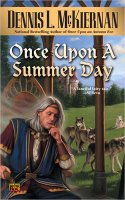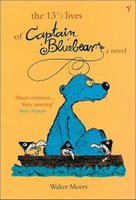 Author:
Author: Dennis L. McKiernan
Published: April 4, 2006 (Roc)
Category: Fantasy
I think
Once Upon a Summer Day had a lot of potential for being a great story, but it got a little full of itself and tried too hard, taking on too much.
Summer Day comes after
Once Upon a Winter's Night; do you see a pattern? The books are set in the land of Faery, where there are many lands, each separated by a twilight mist. The mist reminds me of Terry Goodkind's "veils" dividing three regions in his epic
Sword of Truth series. In this Faery land, there are four distinct lands, each locked in one season for eternity (i.e. in the Winterwood, it is always winter). These "Season" books are inspired by well known fairy tales, and I thought that was a great idea.
We meet Borel, prince of the Winterwood as he's visiting his brother, Prince Alain of the Summerwood. He falls asleep one summer day and dreams of a demoiselle calling for help from a tower, surrounded by daggers. He sets off on a quest to save her, accompanied by various creatures, from wolves to sprites to a bumblebee. It turns out that this plot is based on
Sleeping Beauty, since Michelle (that damsel in distress) was celebrating her eighteenth birthday when a witch tricked her into using a spinning wheel, etc.
Too many things in this book annoyed me to allow me to enjoy it. First, McKiernan tries to use a fairy tale style of speaking (i.e. o'er, 'round, 'tis, etc.), but rather than restricting it to let's say... the beginning of each chapter, or dialogue, he sprinkles it about. It's not often enough to get used to, so every time it happens, attention is drawn more easily to that odd word. To make it even more difficult to get used to the language, McKiernan also throws in a good amount of French. To the characters, French is the "old tongue." However, I'm puzzled at why it's called the old tongue if they talk about all of their food in its French terms. Even the servants speak French, so it's not like only the highborne have been educated in the language. Despite being the so-called old tongue, French words are sprinkled into the text rather liberally (i.e.
oui and
non taking the place of yes and no;
mère and
père rather than mother and father;
demoiselle instead of damsel; so on and so forth). This clash of storyteller speak and French with modern day English grated on my nerves like plaid pants with polka dots.
Borel is a one-dimensional hero (a pity, since this book is so long). We don't really know much about him after spending 372 pages with him. However, in an odd character description moment halfway through the book, McKiernan let us know that Borel's hair-down-there matched the hair on his head. Yeah, weird. Also note that Borel's cover image bears a striking resemblance to
Denethor in
Return of the King. I know he's not really that old (just premature gray hair to match the realm he governs), but the thought of him getting it on with some eighteen-year-old bugs me.
Besides being one-dimensional, Borel loses his equipment too often. For example, when he's at the witch Hradian's hut, he puts some scrolls in his bag, only to lose those right away when she catches him and throw him in a dungeon. When he gets out of the dungeon, he gets his weapons back, and gets a new rucksack, only to lose it when he's climbing out of the building. Then he loses his knife while running to escape the trolls who held him captive. Later, he gets a replacement knife, which he loses in less than 24 hours. At the end of his quest, his new horse dies during the first couple days he's with Borel. Seriously, Michelle shouldn't depend on Borel, because he's likely to lose her too.
Then I think McKiernan got confused with how proper he wanted to make his characters. Borel doesn't want to take advantage of Michelle in their dreams (that's the only way they can communicate while she's locked away), despite the fact that she puts "fire in his veins," or some junk like that. But you know what? Alain and his betrothed, Camille, sleep in the same bed even though they're not married. Later, Michelle seduces Borel while they're going back to the Winterwood. When they return to the Winterwood, McKiernan makes this pointed display of the steward asking Borel if he and Michelle require separate quarters, and Borel saying that they will have adjoining quarters since they're betrothed. Why even stick that in? It was like another bump to add to an already lumpy story. At the very end, Borel and Michelle are about to leave on another journey to see Michelle's parents, so Borel can ask Michelle's father for her hand in marriage. I see that as kind of moot, since Borel's already announced to his entire staff that he and Michelle are getting it on before marriage, and Borel's father is posting the banns.
Seems like McKiernan didn't know when to end the story. Actually, this book could've been 100 pages shorter. Borel's quest was just a big scavenger hunt of gossip, and in summation, I'll say that it sounded something like this: "John doesn't know how to get to the Endless Sands, but Jennie knows. Unfortunately, John doesn't know where Jennie is. However, Julie knows where Jennie is, but she'll only tell you if you break the curse she's under. And then when you get to Jennie, you're going to have to challenge her in a battle of wits."
Skip this book, unless you like being angry.
 Author: Walter Moers
Author: Walter Moers




